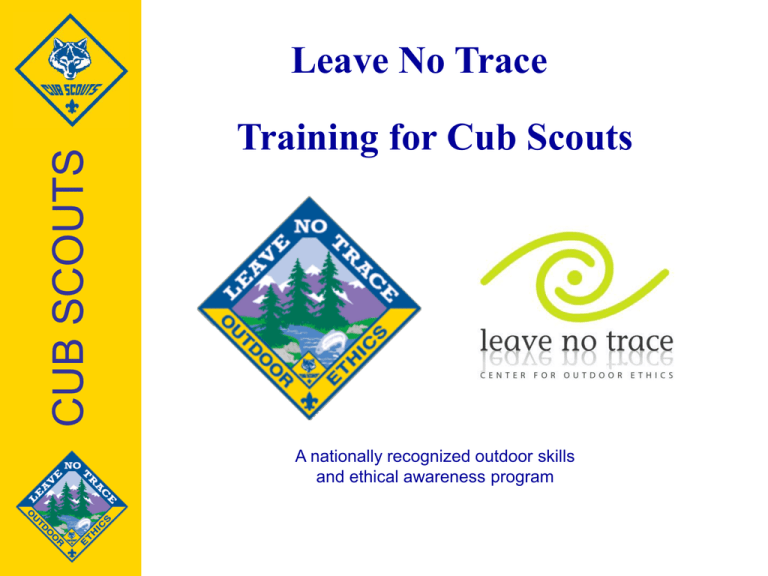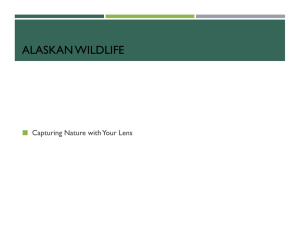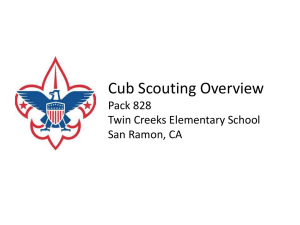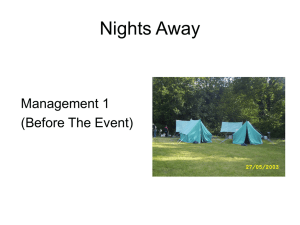Leave No Trace Training for Cub Scouts
advertisement

CUB SCOUTS Leave No Trace Training for Cub Scouts A nationally recognized outdoor skills and ethical awareness program The Six Leave No Trace Guidelines for Cub Scouts CUB SCOUTS Leave No Trace is a plan that helps you to be more concerned about your environment. It also helps you protect it for future generations CUB SCOUTS Watch for hazards and follow all the rules of the park or outdoor facility. Remember proper clothing, sunscreen, hats, first aid kits, and plenty of drinking water. Use the buddy system. Make sure you carry your family's name, phone number, and address. • Know the rules and special concerns for the area you'll visit. • Prepare for extreme weather, hazards, and emergencies. • Schedule your trip to avoid times of high use. • Repackage food to minimize waste. Q&A SCOTS CUB CUBSCOUTS Match the answers: Make a ________ and stick to it. Know the ________ of the campground. Always go with a _________. Prepare for extreme _________ and emergencies. Buddy Plan Weather Rules CUB SCOUTS Stay on marked trails whenever possible. Short-cutting trails causes the soil to wear away or to be packed, which eventually kills trees and other vegetation. Trampled wildflowers and vegetation take years to recover. Stick to trails!. • Durable surfaces include established trails and campsites, rock, gravel, dry grasses or snow. • Protect river bank areas by camping at least 200 feet from lakes and streams. • Good campsites are found, not made. Altering a site is not necessary. CUB SCOUTS Q&A Circle all the correct answers: Durable Surfaces to camp on include? Rock, Bushes, Gravel, Sticks, Dry Grass, Snow, Wildflowers How far should you camp from a River Bank? 1 foot, 10 ft, 200 ft, 1000 ft If you are hiking, you should… - walk through bushes and plants - climb trees - stay on the trail - wear flip-flops CUB SCOUTS Respect Wildlife. Managing your pet will keep people, dogs, livestock, and wildlife from feeling threatened. Make sure your pet is on a leash or controlled at all times. Do not let your pet approach or chase wildlife. When animals are chased or disturbed, they change eating patterns and use more energy that may result in poor health or death. Take care of your pet's waste. Take a small shovel or scoop and a pick-up bag to pick up your pet's waste— wherever it's left. Place the waste bags in a trash can for disposal. • Observe wildlife from a distance. Do not follow or approach them. • Never feed animals. Feeding wildlife damages their health, alters natural behaviors, and exposes them to predators and other dangers. • Protect wildlife and your food by storing rations and trash securely. • Control pets at all times, or leave them at home. • Avoid wildlife during sensitive times: mating, nesting, raising young, or winter. CUB SCOUTS Q&A Complete the sentences: _________ wildlife. Do not let your pet ______ wildlife. Observe wildlife from a _________. Never ________ wild animals. Leave Respect Food Nesting Distance Chase Feed Avoid animals at sensitive times such as when they are ___________ Control pets at all times or _______ them at home. Protect wildlife by storing your ________ in a safe place. CUB SCOUTS When visiting any outdoor area, try to leave it the same as you find it. The less impact we each make, the longer we will enjoy what we have. Even picking flowers denies others the opportunity to see them and reduces seeds, which means fewer plants next year. Use established restrooms. Graffiti and vandalism have no place anywhere, and they spoil the experience for others. Leave your mark by doing an approved conservation project. • Preserve the past: Look, but do not touch cultural or historic structures and artifacts. • Leave rocks, plants and other natural objects as you find them. • Avoid introducing or transporting non-native species. • Do not build structures, furniture, or dig trenches. CUB SCOUTS Q&A True or False: It’s ok to pull up or break plants and trees. It’s a good deed to build furniture and leave it for the next campers. If it came from nature it should stay in nature. We cut down live trees for firewood. We pack out all our trash. CUB SCOUTS Expect to meet other visitors. Be courteous and make room for others. Control your speed when biking or running. Pass with care and let others know before you pass. Avoid disturbing others by making noise or playing loud music. Respect "No Trespassing" signs. If property boundaries are unclear, do not enter the area. • Respect other visitors and protect the quality of their experience. • Be courteous. Yield to other users on the trail. • Step to the right side of the trail when encountering other travelers. • Take breaks and camp away from trails and other visitors. • Let nature's sounds prevail. Avoid loud voices and noises. CUB SCOUTS Q&A Discussion Questions: When passing other hikers or campers what should we do? Do we camp right in the middle of trails? What should we do when we see Private Property – No Trespassing signs? How do you want to be treated by other people when camping? How do you like seeing trash that was left behind? What is Noise Pollution? How do you feel about noise pollution when camping in the woods? CUB SCOUTS Make sure all trash is put in a bag or trash receptacle. Trash is unsightly and ruins everyone's outdoor experience. Your trash can kill wildlife. Even materials such as orange peels, apple cores and food scraps take years to break down and may attract unwanted pests that could become a problem. • Pack it in, pack it out. Inspect your campsite and rest areas for trash or spilled foods. Pack out all trash, leftover food, and litter. • To wash yourself or your dishes, carry water 200 feet away from streams or lakes and use small amounts of biodegradable soap. Scatter strained dishwater. CUB SCOUTS Q&A Match the Answers: Make sure all trash is in a ____________ Trash can kill _____________ Pack out all _____________ __________ your campsite for trash or spilled food Food scraps attract ____________ Inspect trash trash Can wildlife pests DISCUSSION REVIEW Is the picture of something natural or wrong? CUB SCOUTS Explain Why What is the right thing to do? Cub Scouting’s Leave No Trace Awareness Award CUB SCOUTS Cub Scouts Leave No Trace Pledge I Promise to practice the Leave No Trace frontcountry guidelines wherever I go: You can earn the Cub Scout Leave No Trace Awareness Award by doing the following things: 1. Discuss with your leader or parent/guardian the importance of the Leave No Trace guidelines. 2. On three separate outings, practice the frontcountry guidelines of Leave No Trace. 3. Complete the Achievement requirement for your rank. 4. Participate in a Leave No Trace related service project. 5. Promise to practice the Leave No Trace frontcountry guidelines by signing the Cub Scout Leave No Trace Pledge in your scout handbook. 6. Draw a poster to illustrate the Leave No Trace frontcountry guidelines and display it at a pack meeting. Cub Scouting’s Leave No Trace Awareness Award CUB SCOUTS Leave No Trace means traveling and camping with care, deliberately planning, and guiding one's actions so as not to harm the environment or disturb others. What does Leave No Trace mean to you? Learn more at www.LNT.org


